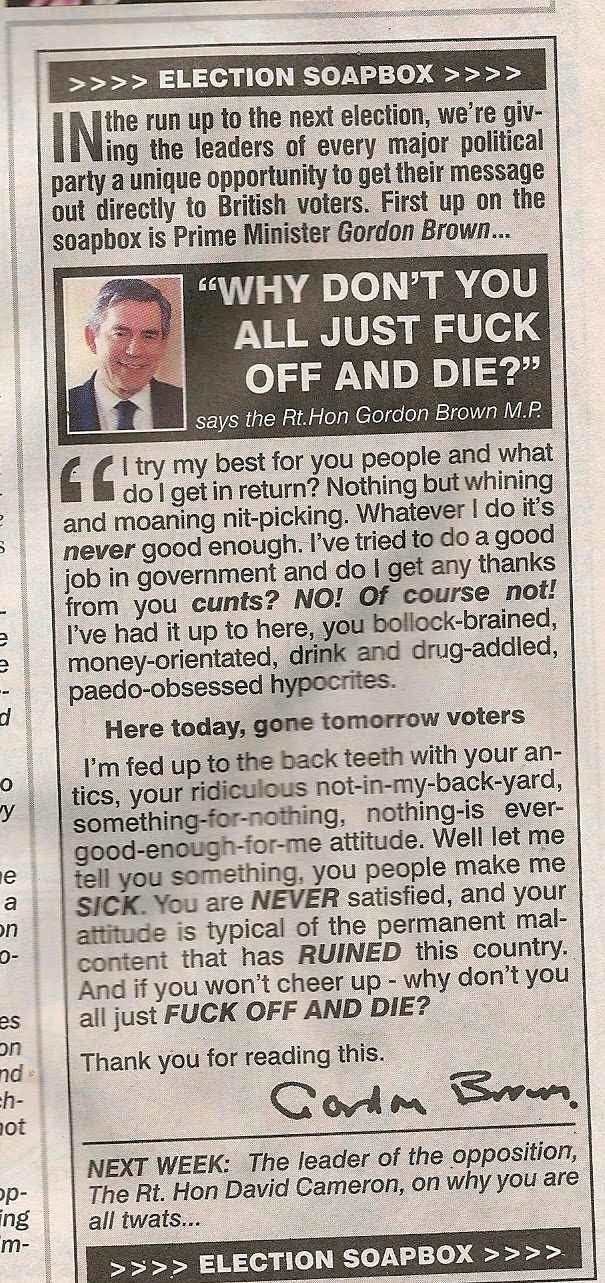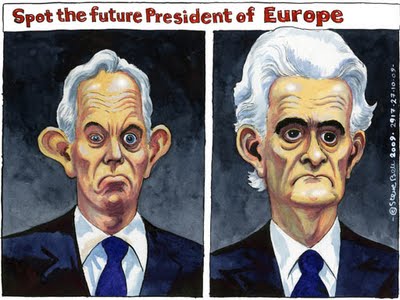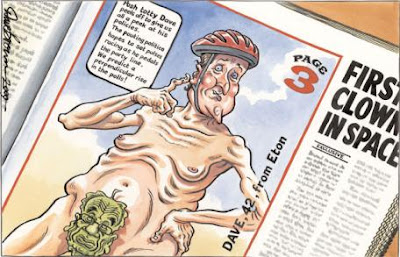Alternative pledge card.

Labels: 2010 election campaign, Gordon Brown, mockery, New Labour, politics, Viz

Labels: 2010 election campaign, Gordon Brown, mockery, New Labour, politics, Viz
Labels: celebrity culture, David Cameron, Gordon Brown, politics, Samantha Cameron, Sarah Brown, we're all doomed
Labels: Chilcot inquiry, Gordon Brown, Iraq, Iraq disaster, politics, Tony Blair
Labels: 2009 election campaign, Andrew Ransley, bullying, character, end of the party, Gordon Brown, New Labour, politics
Labels: 2009 election campaign, Gordon Brown, Labour, politics, slogans
But this change also needs something else. It requires a change in the attitude not just of politicians, but of the media too. I want to see a whole new culture of responsibility from those who report the news. You are the lens through which people view the actions of this Parliament. That gives you a great duty to our democracy.
I want to see a proper distinction between honest mistakes made by good, decent people whose intentions were honourable and those who set out to deliberately mislead, swindle and deceive.
Most people who pursue a career in politics do so because they want to serve and because they want to do good. That should be recognised. Parliament does important and effective work, yet it is barely reported.
And remember when you’re putting good people down, you could be putting good people off from entering politics. I’m not telling you how to do your job. I’m just saying that if you want to change politics as much as I do, this is something we’ve got to do together. We have a shared responsibility.
Labels: Conservatives, constitutional reform, David Cameron, expenses, Gordon Brown, MPs expenses, parliamentary reform, politics, proportional representation, public opinion
Labels: constitutional reform, Gordon Brown, MPs expenses, politics, proportional representation, west lothian question
Hi there,
I visited your website for the first time last night ( http://www.septicisle.info/labels/Gordon%20Brown.html ) and I noticed that you had some condolence/sympathy and funeral related resources within it. You've done a great job of organizing and listing helpful information and I was wondering if you would consider listing my website as a resource for your visitors?
Obituaries Help is a completely free resource for a person looking for condolence/sympathy and funeral related examples and resources.
...
Melanie Walters - Webmaster
Labels: Gordon Brown, miscellany, spam
Labels: Blairite coup, Blairites, Bob Ainsworth, death of Labour, fall of Gordon Brown, Geoff Hoon, Gordon Brown, Patricia Hewitt, politics
Labels: Blairite coup, Blairites, death of Labour, fall of Gordon Brown, Geoff Hoon, Gordon Brown, Patricia Hewitt, politics
Labels: Conservatives, David Cameron, Gordon Brown, Labour, opinion polls, politics
Labels: David Cameron, Gordon Brown, Labour, Nick Clegg, politics, Queen's speech, the new Tories
Mr Brown's apology ended 48 hours of uproar since The Sun first revealed the mistakes in his well-meaning but badly handwritten note.
Jacqui also set the record straight on her contact with The Sun and her recording of the PM's phone call, in which she berated him over troop and helicopter shortages.
Mum-of-six Jacqui, 47, said: "I released the tape because I wanted people to know what he really said to me, not what Downing Street put out.
"I also want to make clear that I didn't take a penny in payment for interviews with The Sun."
Jacqui said she contacted The Sun because the paper backs Britain's Forces, adding: "It had nothing to do with politics."
Labels: abuses by tabloids, Afghanistan, fall of Gordon Brown, Gordon Brown, Jacqui James, politics, Scum-watch, Sun-watch
GB: Whatever information you've been given, that is not correct. But I don't want to interact in a political debate about this...JJ: No that's fine. Nor do I.
Labels: abuses by tabloids, Afghanistan, fall of Gordon Brown, Gordon Brown, Jacqui James, politics, Scum-watch, Sun-watch
"I re-read it later. He said, 'I know words can offer little comfort'. When the words are written in such a hurry the letter is littered with more than 20 mistakes, they offer NO comfort.
"It was an insult to Jamie and all the good men and women who have died out there. How low a priority was my son that he could send me that disgraceful, hastily-scrawled insult of a letter?
"He finished by asking if there was any way he could help.
"One thing he can do is never, ever, send a letter out like that to another dead soldier's family. Type it or get someone to check it. And get the name right."
Labels: abuses by tabloids, Afghanistan, fall of Gordon Brown, Gordon Brown, politics, Scum-watch, Sun-watch
In fact the real message of Biscuitgate is that whatever you do or say as a Prime Minister can and will be woven into any commentator’s particular beef or agenda, in order to prove their point. Who’d be a politician, eh?
That’s not to say Biscuitgate didn’t reveal something about the Prime Minister. We strongly suspect that Mumsnetters resorted to asking about biscuits repeatedly towards the end of the chat because they were frustrated at being fed chunks of official policy rather than being engaged with directly. It’s hard, of course, to keep up with the banter on a board like ours - particularly if you’re not reading the actual chat and you’re a Mumsnet virgin.
But the truth is it has come more naturally to other politicians to speak to and emotionally connect with Mumsnetters. That, I think, is a fair criticism of Gordon Brown, as is a a certain brusqueness, intermittently displayed during his visit. What is unfair is that Biscuitgate proves just how indecisive or insincere Gordon Brown is - he might be, of course - what do I know? But there was absolutely nothing he did during his visit to Mumsnet Towers to suggest it.
Labels: bullshit, fall of Gordon Brown, Gordon Brown, new media, new media bollocks, politics
 We've heard a lot recently about self-inflicted harm and acts of suicide, mainly in connection with the Royal Mail, yet much the same could be said about the curious, perplexing campaign springing up for Tony Blair to be the first permanent president of the European Council. The power and prestige of the post is probably being exaggerated, as Nosemonkey argues, yet it's apparent it's not so much the job and the work involved but the title and impression which the person whom lands it will send.
We've heard a lot recently about self-inflicted harm and acts of suicide, mainly in connection with the Royal Mail, yet much the same could be said about the curious, perplexing campaign springing up for Tony Blair to be the first permanent president of the European Council. The power and prestige of the post is probably being exaggerated, as Nosemonkey argues, yet it's apparent it's not so much the job and the work involved but the title and impression which the person whom lands it will send.Labels: David Cameron, European Union, Gordon Brown, politics, Tony Blair
 They must have known it was coming, but the defection of the Sun back to the Tories after 12 years of "supporting" Labour has still quite clearly shook Labour. While the paper's representatives claim that it was yesterday's speech that finally confirmed they could no longer support the party, it's been obvious that the switch has been coming ever since last year's Conservative conference, when it gave David Cameron the sort of positive coverage he must have dreamed of. Since then the paper has been overwhelmingly anti-Labour without necessarily being anti-Brown. Some of the signs have been slight: calling Cameron "prime minister" when he was invited onto the paper's recently launched piss-poor online radio show was one, but the demand for an immediate general election earlier in the year was far less guarded.
They must have known it was coming, but the defection of the Sun back to the Tories after 12 years of "supporting" Labour has still quite clearly shook Labour. While the paper's representatives claim that it was yesterday's speech that finally confirmed they could no longer support the party, it's been obvious that the switch has been coming ever since last year's Conservative conference, when it gave David Cameron the sort of positive coverage he must have dreamed of. Since then the paper has been overwhelmingly anti-Labour without necessarily being anti-Brown. Some of the signs have been slight: calling Cameron "prime minister" when he was invited onto the paper's recently launched piss-poor online radio show was one, but the demand for an immediate general election earlier in the year was far less guarded.But they FAILED on law and order, their mantra "tough on crime, tough on the causes of crime" becoming a national joke. Knife murders are soaring.
Smirking criminals routinely walk free in the name of political correctness, while decent people live in a virtual police state of snooping cameras and petty officials empowered to spy and to punish.
Most disgracefully of all, Labour FAILED our troops in Iraq and Afghanistan, leaving them to die through chronic under-funding and the shambolic leadership of dismal Defence Secretaries like Bob Ainsworth.
Billions blown employing a useless layer of public service middle-managers like those who condemned Baby P to die.
If elected, Cameron must use the same energy and determination with which he reinvigorated the Tory Party to breathe new life into Britain.
That means genuine, radical change to encourage self-improvers, not wasting time on internal party wrangling or pandering to the forces of political correctness. It also means an honesty and transparency of Government that we have not seen for years.
We are still a great people and, put to the test, will respond to the challenges we face.
The Sun believes - and prays - that the Conservative leadership can put the great back into Great Britain.
Labels: David Cameron, death of Labour, Gordon Brown, politics, Rupert Murdoch, Scum-watch, Sun-watch, tabloid analysis